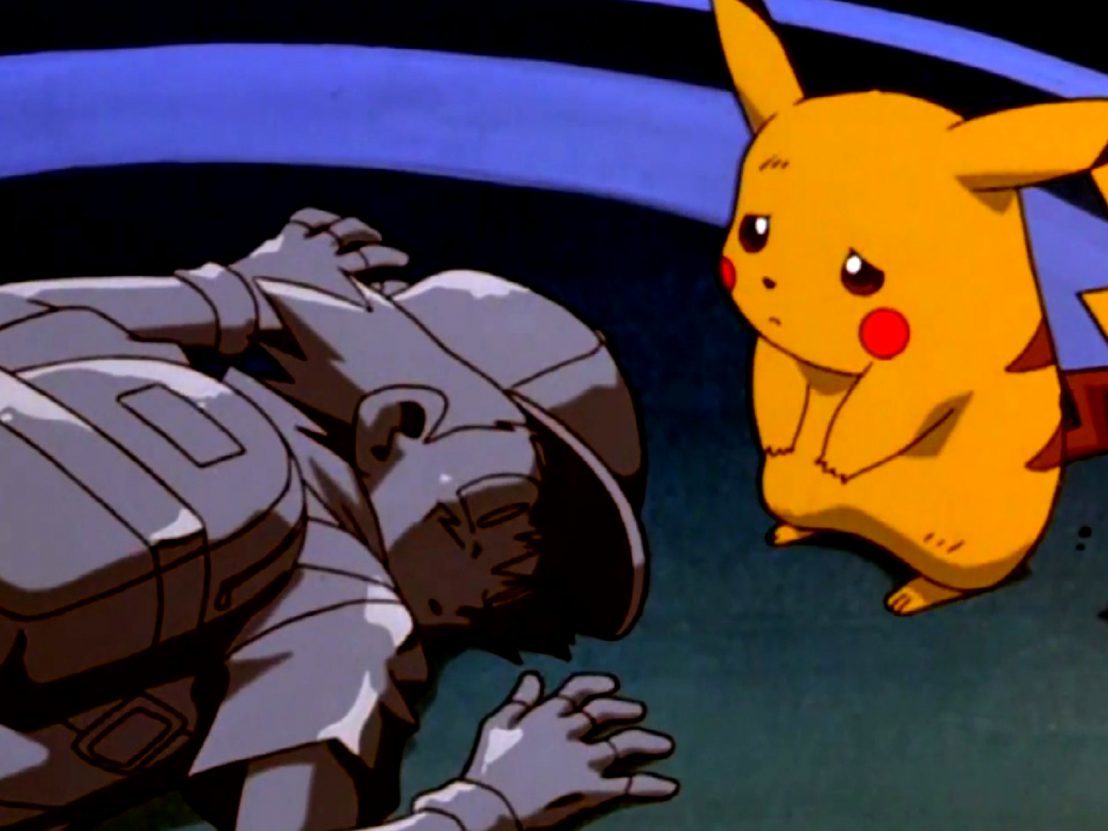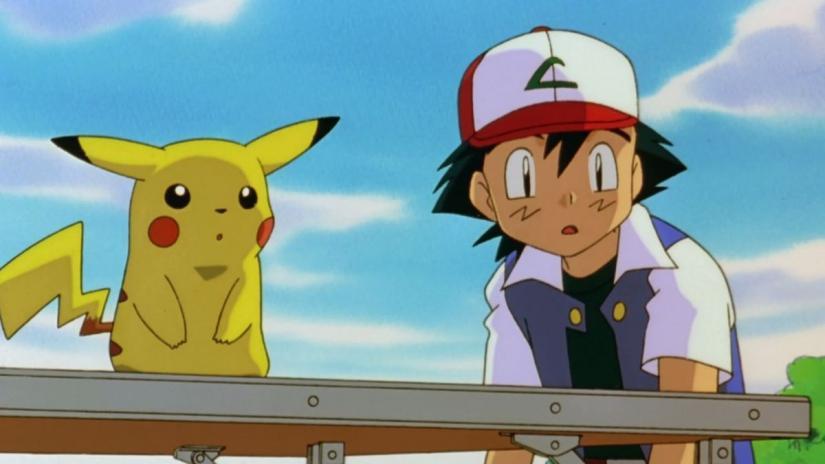Did you know that the original Pokémon movie is still the highest grossing anime movie in the US? No matter how many critically acclaimed Studio Ghibli movies come out, there's no denying the power of Pikachu and the Pocket Monsters.
But the original Pokémon movie, or Pokémon: The First Movie: Mewtwo Strikes Back, didn't get anywhere near the critical praise that other anime movies have received outside Japan. Western critics called the movie an obvious attempt at selling toys, and called out the movie's contradictory anti-violence message that goes against the very point of the anime and games.
Yet in Japan, Pokémon: The First Movie was better received critically. While the complex philosophical themes were criticized for being too difficult to understand for children, the film's exploration of cloning and genetic modification was praised, according to Joseph Tobin's book, "Pikachu's Global Adventure: The Rise and Fall of Pokémon."
Before Detective Pikachu is unleashed in theaters and makes us all party like its 1999, let's put on our tiny detective hats and see what the hell happened to the original Pokémon movie and solve the twisty mystery of why the Japanese version is much, much better.
Twisty Indeed
The basic plot is that Ash and his friends are invited to a mysterious lair on a remote island to meet the world's greatest Pokémon trainer, who is organizing a private tournament with the best trainers around. When they arrive, they realize the trainer is actually a powerful psychic Pokémon named Mewtwo, who has created an army of clones and plans to take over the world and kill everyone. Except this last bit is completely different in the Japanese version, and Mewtwo's motivation is actually a lot more developed.
You see, when Pokémon: The First Movie was released in Japan in 1998 it was accompanied by an audio drama that aired on Japanese radio before the movie, and was added as an animated prologue to the movie's TV broadcast later on. It was called The Birth of Mewtwo. The ten-minute short served as a prologue detailing how Mewtwo came to be. Though the short was added in North America to the sequel Mewtwo Returns, it is completely absent from the original movie where it belongs.
Read next: How The Detective Pikachu Movie Makes Pokemon Work In The Real World
It tells of a group of scientists, led by a Dr. Fuji, who found a fossilized sample of the DNA of Mew, the original mythical Pokémon. They successfully clone Mew and enhance it to create Mewtwo, the most powerful Pokémon alive.
When Mewtwo gains consciousness, it uses its psychic powers to communicate with a cloned Bulbasaur, Squirtle, and Charmander that reside in the lab, as well as Ambertwo, the clone consciousness of the deceased daughter of Dr. Fuji, and they all become friends. This happiness isn't allowed to last, and complications with the cloning process cause Mewtwo's friends to fade away Thanos-style and die. We watch as poor, little Mewtwo witnesses its only friends in the world die, and starts crying. This is a being that doesn't know who it is and what it's meant to do, two questions that carry its whole character throughout the movie. Traumatized by watching a smaller version of The Snappening, Mewtwo starts activating its psychic powers, which prompts the scientists to put him in stasis for years.

(The short also explains that Pokémon tears are special--because their tears are filled with life. This explains how they can magically revive Ash when he turns to stone later in the movie.)
Then the actual movie begins. Mewtwo wakes up wondering who it is, where it is, and why it came to be. When it doesn't get the answers it wants, Mewtwo blows everyone up.
This short prologue alone gives us an entirely different Mewtwo, one that isn't just a despot wanting to kill everyone, but a confused creature in the middle of an existential crisis.
In a series of blogs, Takeshi Shudo, chief writer for the original series of the anime and the first movie, detailed his original plans for Pokémon: The First Movie. He wrote that prologue in order to make a film that not only entertained kids, but mentally stimulated their parents with some tough questions of existentialism. The conflict of his film came from Mewtwo's struggle to find meaning to its existence. This is far less ambitious in the version of the movie localized for Western audiences; in the original, there is no wanting to annihilate the world and rule it. All Mewtwo wants is answers to the questions regarding its identity, purpose, and most of all, value.
Mewtwo then decides the best way to do this is by testing its power. If Mewtwo is stronger than the strongest Pokémon trainers, or even Mew, then surely its life has value? If Mewtwo's clone army can defeat natural-born Pokémon, then they must have a more valid reason to live than the originals, right? While Mewtwo does mention that humans aren't fit to rule the world, when asked, he mentions that Pokémon aren't fit either--he's just trying to figure out his place the only way he learned how.
I Mewtwo, Therefore I Am
The original version of Mewtwo is not just a maniacally evil and genocidal psychopath, but a villain with depth and an arc. So what happened?
Turns out, Nintendo and 4Kids happened. The official, very '90s US website for the movie clearly states that "Pokémon: The First Movie had to be virtually reimagined for American audiences." Nintendo, which owns all rights to Pokémon in America, brought 4Kids Entertainment (who also localized Yu-Gi-Oh! and One Piece in the US) on board to essentially "Americanize" the movie. 4Kids is infamous for heavily censoring the shows they buy, removing things like guns, cigarettes, and religious symbols, and even changing Japanese food like rice balls for more recognizable American food like jelly donuts. In the year between the Japanese and US releases of the movie, 4Kids's Norman Grossfeld "dramatically rewrote the script, incorporating all-new story elements," according to the website. They also re-scored the entire movie with music that Grossfeld thought "better reflected what American kids would respond to," which explains the weird inclusion of Christina Aguilera and M2M, and also the very excellent "Brother My Brother," which plays during the final battle.
These changes did not sit well with the writers and producers of the Japanese original. As written in an essay and quoted by Tobin in "Pikachu's Global Adventure: The Rise and Fall of Pokémon," executive producer Masakazu Kubo wrote that "The people at Warner gave us some hassle over the script. According to them, the Japanese original does not distinguish clearly enough between the good guys and the bad." According to Kubo, the distributor told him that the viewers would not be able to know who to identify with and who to cheer on. "In other words, the heroes and villains needed to be identified clearly."
It is a perfectly reasonable concern. After all, kids would not understand that Mewtwo was supposed to be the villain. He only kills a bunch of people at the beginning of the movie, fights against Ash and turns him to stone, and the movie is called "Mewtwo Strikes Back," but, you know, kids are dumb! The only way they will know that Mewtwo is the villain is if we make him want to take over the world and kill every single human. Otherwise, the kids may not identify with Ash, the main guy from that super popular TV show the movie is based on.
In the end, Grossfeld changed quite a bit, including the opening narration that talks about the meaning of life, the pop music, well known gaffes like a character calling a Pidgeot a Pidgeotto, and everything pertaining to the climax of the movie.

After Mewtwo unveils his army of clones, Ash foolishly attempts to punch the villain in the face, but is sent flying away, before Mew arrives and saves Ash. Then Mewtwo declares that it is more powerful than Mew and will prove it in battle, while also psychically blocking his clone army's abilities so they can fight the old-fashioned way, with tooth and nail instead of flamethrowers and water-cannons.
Mew sides with the original Pokémon to fight Mewtwo. Watching Grossfeld's version for the West, one can see Mew as almost a messianic hero who defends Ash and the other Pokémon from Mewtwo's evil and saves them with an anti-violence message, saying that "shows of force prove nothing, real strength comes from the heart." Meanwhile, watching the original Japanese version based on Takeshi Shudo's script you see a different side of the little Pokémon, with Mew saying that the originals are the only real living creatures and they won't lose to the copies. Mew in this movie goes so far as to say it can't forgive the existence of a copy made by humans, so they fight--seemingly to the death.
While the heartbreaking fight is going on, we cut to the human characters witnessing the carnage, and here is where the biggest and worst change happens. In the US dub, which was then translated in all Western countries, the characters realize that violence is wrong, and Pokémon should absolutely never fight one another. It's a very strange message to have in a movie based on a franchise that's all about having Pokémon fight each other.
Only this isn't the message of Shudo's original script. Since the whole point of Mewtwo was that it wanted to find its place in the world and the fighting was a way to show that the clones' lives had more value, the human characters' moment of realization involves them talking about how both originals and copies are still living creatures and therefore their lives have value. When Ash gets petrified and the Pokémon tears bring him back, both Mew and Mewtwo finally realize that all lives are meaningful--whether human or Pokémon, original or lab-grown.
This message is far more fitting of the franchise's mythology, since Pokémon don't really fight to the death, they just "faint." It's a shame that 4Kids never understood the message, and did everything it could to make a compelling and complex film into a merely entertaining but dumb kids' movie. Takeshi Shudo may have had some weird ideas--he wanted to end the anime with the revelation that it was all in Ash's head, including a movie involving a Spartacus-like revolution led by Pikachu where Pokémon rebelled against their trainers--but there's no denying that the Japanese version of Pokémon: The First Movie had a way more fitting message, even if lacked that killer pop soundtrack.
Read next: How Detective Pikachu's Filmmakers Kept Hardcore Pokemon Fans In Mind
